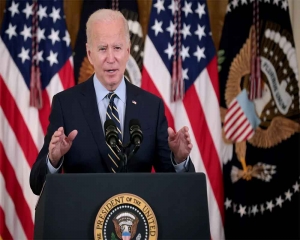90 God Days
Author - Madhur Prabhakar
Publisher - LiFi, Rs 195
A thoroughly humorous read, 90 God Days engages in largely harmless, comic-bookish ways of the old world where true love overcomes the boundaries of religion, writes KALYANEE RAJAN
Hindu mythology has seen several reworks over the past couple of decades whether it be through the visual modes of TV and cinema, or via printed forms like novels and short fiction. Most of the popular reworkings of mythology have been for a specific agenda of either excavating the myths, spurring devotion through better circulation, or exploring lesser known characters or incidents, or adding to the existing grand narratives.
Acclaimed mythological fiction by writers such as Chitra Banerjee Divakaruni, Devdutt Pattanaik and the like have led to creative and/or critical progressive reinterpretation of several episodes from Hindu mythology. All such endeavours have been undertaken with a great degree of research and seriousness as befits the subject matter, and that translates into a certain graveness of the plot, and solemnness of the idiom so employed. Madhur Prabhakar, who identifies himself as ‘a new age story teller’, a strategic marketing leader by profession and a writer by choice, presents his debut novel 90 God Days in a completely dissimilar manner, comfortably and safely nesting it within the category of “Fiction/Fantasy/Humour”.
The intriguing title and the smartly done cover urge the reader to plunge into the 250 pages-long novel, which begins quite disarmingly, with the ‘Writer’s Note’, more of a disclaimer, about not wishing to hurt religious sentiments, and how the book is about Prabhakar’s version of his God, a God who is ‘vulnerable, at the same time a lot of fun’ (sic). Prabhakar says he wants to relate to his god rather than just read about him, a god who ‘has a sense of humour and he doesn’t mind letting his children have a bit of fun’. Prabhakar has no pretensions about copious or serious archival research before penning his tale and admits relying on ‘stories as narrated to him’ as a child, various online information, and creative extrapolations by his own initiative.
The story lies sandwiched between a prologue and an epilogue in the traditional epic style, providing the frame story of Lord Vishnu landing himself a punishment to spend time on the earth, bereft of his godly powers for a period of 90 God days as stipulated in the ‘Heaven Charter’ for his overruling of another deity, in this case, Indra’s actions.
Shiva and Brahma sit in the council meeting, deliberating upon the quantum of punishment for Vishnu, taking due cognizance of Indra’s complaints. Prabhakar makes the Gods way too relatable to the generation Y: “Brahma buddy, we can’t punish Vishnu for this small offence…” Shiva pleads, while Brahma responds, exasperated, “Dude, I understand what you’re saying…If I don’t take any actions, then Indra and few of his other deity friends would be really pissed.”
After the initial shock of the slang lingo subsides, one is increasingly drawn into the plot, knit deftly with no great complexities or surprises. The reader soon takes sides and sympathises with the curiously named Muslim atheist Karun Ahmed, son of a curiouser Akshat Ahmed, retired army officer, and his homemaker wife, Shagun Ahmed, both devout Roza-observing Muslims.
The tale is spun around the mythic and the human running on parallel planes: Goddess Ganga decides to intervene and reclaim for once her righteous place as Vishnu’s wife over Lakshmi, while Ganesha, terribly concerned about the balance of the world, both earthly and heavenly, plunges all his powers: Mental and spiritual, towards thwarting his maternal aunt’s designs and making sure his favourite uncle Vishnu stays on track in his earthly form.
Also interwoven are narratives of how another God residing in the heavens, Muhammed of the Muslims, is actually the brother of Brahma and is extremely unhappy about whatever is happening ‘in his name on Earth’, with a ‘lot of extremist idiots to take care of’ and requiring to take action on the ‘continued genocide in a portion that earthlings call Iraq’. The tale breezes through the budding friendship and romance of Karun with a simple, beautiful earthling called Swastika Sharma, a staunch Hindu.
The twist in the tale comes with the entry of the mysterious and stunning Shaina who draws Karun to herself, toppling all balance. It is up to the clever and genius boyish God Ganesha to tread carefully through the Heaven Charter, the various clauses and sub-clauses of Gods Power Act, and to get the right set of couple together.
Aiding him in his noble enterprise are a motley of famous characters: Brahma’s aide Chitragupta, the dream-weaver Morpheus, Galileo, Aryabhatta, and, Alan Turing, of The Imitation Game fame. The Hindu-Muslim contrast however, seems contrived, and deliberately stretched most of the time, being the weakest link in the story.
The book shows how at the end of each tale, there’s the triumph of Dharma despite several hurdles; order is ultimately restored towards the heart-warming end. Drawing upon several episodes and professional technicalities from his strategic marketing background, Prabhakar brings the world of the Gods alive in a slightly more relatable way, as they discuss their anxieties, commit mistakes and pay for them, and yet uphold their overarching benevolence upon the entire human race. 90 God Days is a short and sweet treat to be enjoyed in one go.


























